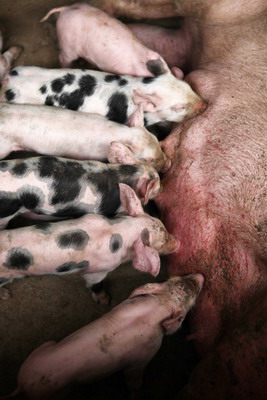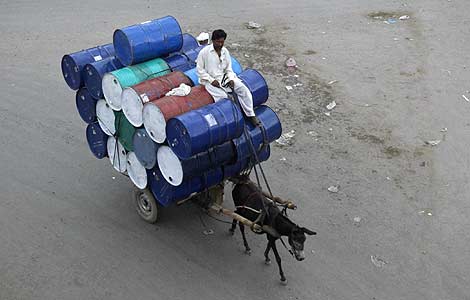Pig farmers hope to breed success
Updated: 2011-08-22 09:57
By Yang Wanli and Shi Baoyin (China Daily)
|
|||||||||||
|
 |
|
Piglets are fed in the traditional way until it's time to grow them into market size. [Photo / China Daily] |
Of the 609 million hogs China raised in 2008, only 1 percent came from hog producers raising more than 50,000 pigs every year. US-based Smithfield Foods has about 900,000 sows producing 14 million market hogs annually, making it the world's largest producer of hogs.
China is on its way toward large scale. A growing number of companies have laid out plans to build massive industrial-scale pig farms. Chuying is investing 4 billion yuan to build a 400,000-hectare organic pig-breeding farm in Henan that would have an annual capacity of 1 million hogs.
Sichuan-based New Hope Group, China's top animal feed producer, plans to expand its own hog production by 3 million in the next three years to tap growing domestic demand.
Thailand's CP Group has started construction of a 500,000 hogs-a-year farm in Shandong province. The company is also building two farms to produce 1 million pigs a year, one each in Guangdong and Henan provinces.
Li Minghui, a research fellow with the Chinese Academy of Agricultural Sciences, said that more family pig farmers have signed up with larger scale companies. "Small breeders have very limited capability to withstand market risks," he said. "The structure change will benefit both raisers and consumers."
Increasing exports
The US Department of Agriculture recently published a report, "US pork exports to China are increasing". It cited China's strong economic growth, market demand for pork and declines in China's pork production.
US exports to the Chinese mainland reached 192,500 metric tons (valued at $169 million) in the eight months ending in February 2011. Exports to Hong Kong (most of which are re-exported to the mainland) added 63,600 tons ($92 million) to this total.
According to the US Meat Export Federation, US pork exports to the mainland jumped 1,492 percent in the first half of 2011.
"We cannot simply say that increasing imports will hurt Chinese raisers. It takes time for us large-scale companies to hold a bigger share of the market," said Wu Yide, Chuying's board secretary.
"Imported meat or foreign investment will not shake an industry that has existed in China for thousands of years."













